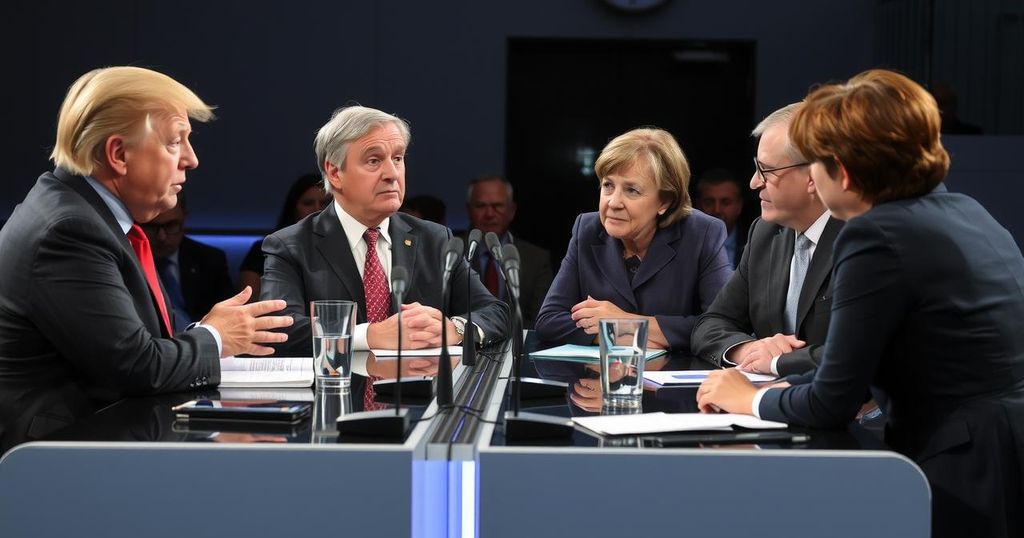World news
AFD, ASIA, BUNDESTAG, CHINA, DEFENSE SPENDING, EUROPE, EUROPE/ASIA, EUROPEAN UNION, FREE DEMOCRATS, FRIEDRICH MERZ, GERMANY, GREEN PARTY, IMMIGRATION POLICY, JO, JÖRG LAU, MEXICO, NORTH AMERICA, POLITICS, POPULISM, PUTIN, REICHSTAG, RUSSIA, SCHOLZ, UKRAINE, VOLKSWAGEN, WORLD WAR II
Ethan Kumar
0 Comments
Germany Faces Political Tumult as Snap Elections Loom
Germany’s Bundestag has witnessed an unusually aggressive session as Chancellor Olaf Scholz and opposition leaders exchanged insults, coinciding with a vote of confidence failure that leads to snap elections. The nation faces an economic crisis affecting key industries, and a rise in far-right and far-left parties complicates the political landscape. With a potential Trump presidency looming, Germany must navigate its internal strife to secure a stable future in Europe.
This week’s extraordinary session of the Bundestag revealed a striking departure from the usual decorum expected in German political discourse. Chancellor Olaf Scholz and opposition leaders engaged in a particularly heated exchange marked by personal insults. Following Scholz’s unsuccessful vote of confidence, Germany faces early federal elections on February 23, an unprecedented situation that raises concerns about the stability of the country’s leadership amid escalating crises.
The current political climate is starkly contrasted with Germany’s postwar history. Scholz openly criticized his former coalition partners while the opposition retaliated with harsh critiques of both his leadership and policy decisions. With signs of a deepening economic crisis exacerbated by rising energy prices and poor management, the vulnerability of the once-stalwart German automotive sector has raised alarms about potential repercussions on employment and economic stability.
The political landscape simultaneously witnesses a rising tide of far-right and far-left movements, disrupting the traditional party dynamics. The Alternative für Deutschland (AfD) party has gained traction with anti-establishment rhetoric, leaving the Social Democrats (SPD) struggling to maintain relevance. In light of contentious international dynamics, particularly vis-à-vis the conflict in Ukraine, debates around military support have polarized public opinion, further complicating Germany’s political framework and consequential decision-making.
As early elections loom, Germany encounters myriad challenges that could influence European politics significantly. The specter of a potential return of Donald Trump to the White House poses additional diplomatic risks, particularly if trade tensions escalate into punitive measures against Germany. Consequently, effective and cohesive leadership is now more essential than ever as divergent factions vie for influence and dictate the nation’s response to internal and external pressures.
Nevertheless, possibilities for reform exist as calls for government spending to revitalize infrastructure and defense capabilities grow louder. As the political climate continues to shift, the need for strategic collaboration among parties becomes paramount. The political gales buffeting Germany must ultimately yield to constructive debate and unified vision to secure a future where democracy prevails and the nation’s interests are safeguarded.
The article discusses the current state of German politics amid unprecedented turbulence and an impending economic crisis, characterized by a recent tumultuous Bundestag debate. Chancellor Olaf Scholz’s coalition government has faltered, raising the specter of snap elections. The political atmosphere is complicated by rising extreme parties and the implications of international relations, particularly with the United States, as the country prepares for its next electoral round in February 2025. The balance of power in Europe also hangs in the balance, spurred by the Russian war in Ukraine and shifting alliances.
In summation, Germany stands at a pivotal crossroads, grappling with intense political discord and the potential ramifications of early federal elections. The necessity for unity and collaboration among political factions becomes critically urgent as external pressures mount. The outcomes of this tumultuous period could redefine not only the future of Germany but also its role within the European Union and the transatlantic alliance, emphasizing the significance of strategic governance in the face of adversity.
Original Source: www.theguardian.com




Post Comment